The Soul Station on 1440 on the Dial Transformed Detroit’s Black Media Landscape Radio has always been the heartbeat of communities, a medi
The Soul Station on 1440 on the Dial Transformed Detroit’s Black Media Landscape
Radio has always been the heartbeat of communities, a medium that informs, entertains, and connects people in ways that transcend geography and generations. But in the mid-20th century, Detroit’s African American population—thriving, resilient, and forging its own identity—had few platforms that truly spoke to them. That was until November 7, 1956, when two visionaries, Dr. Haley Bell and Dr. Wendell Cox, launched WCHB-AM, making history as the first Black-owned and operated radio station built from the ground up in the United States.
Over the decades, WCHB became more than just music and talk—it was a cultural movement, a pillar of civil rights activism, and a bridge between the city’s Black community and the broader world. Its evolution, including the birth of WJZZ, Detroit’s premier jazz station, ensured that its legacy remained deeply intertwined with the city’s soundtrack and social fabric.
A Station Born from Vision & Necessity
The 1950s marked a turning point for Black media, but ownership remained in the hands of white executives, shaping programming that did not fully reflect the lives of African Americans. Dr. Haley Bell, a Detroit dentist, and his son-in-law, Dr. Wendell Cox, sought to change that narrative. With WCHB, they envisioned a station that would not just play music but serve as the pulse of Detroit’s Black community.
The station, originally based in Inkster, Michigan, immediately filled a void, providing a platform for Black voices, artists, and activists. Unlike many Black-oriented radio stations at the time—often owned by white corporations—WCHB was founded, funded, and operated by Black entrepreneurs, marking a critical milestone in media ownership.
WCHB first gained prominence in Detroit after its launch on November 7, 1956. As the first Black-owned and operated radio station built from the ground up, it quickly became a cultural and informational hub for the city’s African American community. The station was based in Inkster, at 32790 Henry Ruff Road, and its programming reflected the vibrant and growing Black population in Detroit at the time.
WCHB’s Programming in the 1950s
During its early years, WCHB’s programming was deeply rooted in serving Detroit’s Black community, offering a mix of music, news, and community engagement. Some key aspects of its programming included:
- Music: WCHB played a crucial role in promoting rhythm and blues (R&B), gospel, and jazz, genres that resonated with Detroit’s Black audience.
- Community News & Civil Rights: WCHB was more than just a music station—it was a voice for civil rights and social justice. The station aired discussions on racial equality, labor rights, and local activism, ensuring that Detroit’s Black residents stayed informed about issues affecting their community.
- Religious & Inspirational Programming: Many early Black-owned radio stations featured gospel music and sermons, and WCHB was no exception. The station provided airtime for local pastors and religious leaders, reinforcing its role as a pillar of the community.
- Local Business & Advertisements: WCHB supported Black-owned businesses by featuring advertisements and promotions tailored to Detroit’s African American population. This helped foster economic growth and community solidarity.
- Public Service Initiatives: The station was involved in charity events and community outreach, including programs like Operation Happiness, which provided underprivileged children with opportunities to attend events like the Shrine Circus.
WCHB’s programming in the 1950s laid the foundation for its continued success in the following decades, making it one of Detroit’s most influential radio stations. Its commitment to music, civil rights, and community engagement ensured that it remained a beloved institution in the city.
The Soundtrack of Detroit Soul: Music and Black Content That Moved Generations
Music has always been the lifeblood of Black radio, and WCHB understood that from the start. The station’s programming was deeply rooted in R&B, gospel, jazz, and soul, catering to an audience that craved representation. WCHB was instrumental in elevating legendary artists, including Aretha Franklin, who was closely connected to Detroit’s music scene. The station provided airtime for local pastors and choirs, reinforcing its role as a spiritual and cultural beacon. WCHB later expanded into jazz through its sister station WCHD-FM, which would eventually become WJZZ, one of Detroit’s most beloved jazz stations.
Community & Civil Rights: More Than Just Radio
WCHB was never just about entertainment. It was a crucial player in Detroit’s civil rights movement, amplifying conversations about racial equality, economic empowerment, and political activism.
- Operation Happiness: This initiative took underprivileged children to events like the Shrine Circus, fostering joy and opportunity.
- Labor Rights & Community Issues: WCHB covered workers’ rights, housing struggles, and economic barriers faced by Black Detroiters.
- Civil Rights Coverage: The station was a hub for activism, ensuring that listeners were informed about marches, protests, and legal battles.
By the early 1960s, WCHB continued to grow as a pillar of Detroit’s Black community, expanding its programming and influence. The station remained committed to serving African American listeners by providing music, news, and cultural programming that resonated well with the city’s Black population.
WCHB’s Evolution in the Early 1960s
In 1959, Bell Broadcasting received a permit to operate an FM station, WCHD-FM (105.9), which allowed for evening programming. This expansion helped WCHB reach a broader audience and offer more diverse content. WCHB was deeply involved in Detroit’s Black community, sponsoring sports teams, organizing charity events, and supporting local businesses. The station continued to feature R&B, gospel, and jazz, helping to elevate Black artists and shape Detroit’s music scene. Legendary DJs like Bill Williams, Bill “Butterball” Crane, Jay Butler, Robbie D., and Martha Jean “The Queen” Steinberg became household names.
How Much of WCHB’s Programming Served the Black Community?
WCHB was entirely dedicated to serving Detroit’s Black community. Its programming was designed to inform, entertain, and empower African American listeners. Some key aspects included: WCHB provided critical coverage of civil rights issues, keeping Detroit’s Black residents informed about racial justice movements and local activism. The station aired gospel music and sermons, reinforcing its role as a spiritual and cultural hub. WCHB promoted Black-owned businesses, helping to foster economic growth and community solidarity.
By the mid-1960s, WCHB had firmly established itself as one of Detroit’s most influential radio stations, shaping the city’s Black cultural and political landscape.
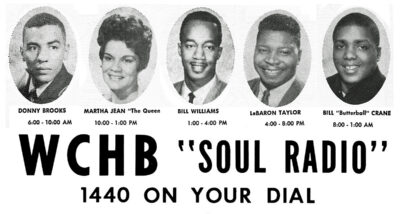 Bill Curtis, the program director of WCHB in 1966, once told Billboard (August 13, 1966) , “This station has been building up over the past two years. It’s owned by two Negro doctors who’ve been extremely involved in community affairs, so people look to us as leaders in the community.
Bill Curtis, the program director of WCHB in 1966, once told Billboard (August 13, 1966) , “This station has been building up over the past two years. It’s owned by two Negro doctors who’ve been extremely involved in community affairs, so people look to us as leaders in the community.
“Too, our sound is as good or better as any station in town. We have strong deejays: Bill Williams is one of the best in the country, a top 40 type of personality. And we have Martha Jean Steinberg. All of our personalities are just as smooth, as competent as any jock on any station.”
Like other program directors, Curtis felt the over-all status of the R&B deejay has made tremendous progress in the past year. And one reason why they have achieved status in the community, he said,“is that in the old days the stereotyped R&B deejay said anything that came to mind. It often offended people or was distasteful. Today, with modern production and tight programming, the deejay only have time for news, temperature, announcing the time, and playing records. There is very little time left in possibly saying the wrong thing.”
Legendary Voices: The DJs Who Defined a ’60s Era
WCHB was home to some of the most iconic voices in Black radio, personalities who brought energy, charisma, and an authentic connection to the audience.
- Martha Jean “The Queen” Steinberg: One of the most powerful voices in Detroit radio, Steinberg, then at WJLB in July 1967, stayed on-air for 48 straight hours during the 1967 Detroit riots, urging calm and helping to prevent further violence.
- Bill “Butterball” Crane: A smooth-talking, dynamic personality, Crane was a key figure at WCHB before moving on to WVON in Chicago.
- Jay Butler: A staple of WCHB, Butler helped define the station’s sound and kept audiences engaged.
- Robbie D.: A Caucasian DJ from Pittsburgh, Robbie D. was rare in Black radio but deeply respected for his love of R&B and soul.
- Ernie Durham: A Detroit radio legend, Durham’s electrifying presence made WCHB one of the most listened-to stations in the Midwest.
- Bill Williams: Williams was a key figure in Detroit’s Black radio scene, serving as both a DJ and station programmer at WCHB-AM during its most influential years.
Martha Jean “The Queen” Steinberg was a trailblazing radio personality who left an indelible mark on Detroit’s airwaves. She joined WCHB in 1963, bringing her charismatic presence and deep connection to the Black community. Before arriving in Detroit, she had already made history at WDIA in Memphis, one of the first radio stations with an all-Black staff.
Martha Jean at WCHB (1963-1966)
Steinberg was a powerful voice on WCHB, known for her engaging style, deep musical knowledge, and ability to connect with listeners. She played a pivotal role in promoting R&B and gospel music, helping to elevate Black artists in Detroit. Her influence extended beyond radio—she was deeply involved in Detroit’s nightclub scene, introducing artists at venues like Baker’s Keyboard Lounge, The 20 Grand, and the Fox Theater. She was friends with Motown’s Funk Brothers, the legendary session musicians behind countless hits.
Transition to WJLB & the 1967 Detroit Riots
Steinberg left WCHB for WJLB on October 24, 1966. On July 23, 1967, as the Detroit riots erupted, she convinced WJLB to cancel its normal programming so she could go on-air and urge calm. She stayed on-air for 48 straight hours, pleading with listeners to stop the violence and prevent further destruction. Many credit her powerful presence with helping to de-escalate tensions, ensuring the riots didn’t become even more devastating.
Her Later Years & Legacy
In the 1970s, Steinberg became an ordained minister, incorporating spiritual messages into her broadcasts.After WJLB transitioned to FM in 1980, she purchased WMZK-AM in 1982, renaming it WQBH (“Queen Broadcasts Here”), focusing on gospel programming. She remained a beloved broadcaster until her passing on January 29, 2000.
Martha Jean “The Queen” Steinberg was more than a DJ—she was a community leader, civil rights advocate, and cultural icon. Her ability to connect with Detroit’s Black community made her one of the most influential voices in radio history.
Bill “Butterball” Crane at WCHB
Crane was a charismatic and engaging DJ, known for his smooth delivery and deep connection with Detroit’s Black audience. He played a major role in shaping WCHB’s sound, spinning R&B, soul, and gospel that resonated with listeners. His presence at WCHB reflected the station’s commitment to great music and community engagement, making him a beloved figure on Detroit’s airwaves. After his tenure at WCHB, Crane moved on to WVON in Chicago and later WNOV in Milwaukee, continuing his journey in soul radio.
Bill “Butterball” Crane at WVON Chicago
Crane joined WVON 1450 AM, Chicago’s legendary R&B station, in the mid-1960s, becoming one of its most recognizable voices. WVON, founded by Leonard and Phil Chess of Chess Records, was a cultural beacon for Chicago’s Black community. Crane was part of WVON’s “Good Guys” lineup, alongside Herb Kent, E. Rodney Jones, and Pervis Spann, bringing soul music and social commentary to the airwaves. His smooth delivery and humor made him a fan favorite, and his presence helped solidify WVON’s reputation as a powerhouse in Black radio.
You can listen to a 1968 WVON aircheck featuring Crane here.
Bill “Butterball” Crane at WNOV Milwaukee
fter his success in Chicago, Crane moved to WNOV 860 AM in Milwaukee, another key station for Black radio. WNOV was Milwaukee’s first full-time Black radio station, and Crane helped shape its identity. His signature style continued to resonate, making him a beloved figure in Milwaukee’s Black radio scene. His contributions played a key role in enhancing the Midwest’s vibrant soul radio landscape.
Crane’s legacy in Black radio extended far beyond Detroit—his work at WVON and WNOV ensured that soul music, community engagement, and Black voices remained at the forefront of urban radio. His influence is still celebrated today, and you can explore more about his time at WVON here and here.
Jay Butler was a pillar of Detroit’s Black radio scene, shaping WCHB’s sound and later transitioning into gospel broadcasting, where he continued to inspire audiences. His career spanned six decades, making him one of the most respected voices in urban radio.
Jay Butler at WCHB: A Voice for Detroit
Butler started his radio career at WJAK in Jackson, TN, before moving to WVOL in Nashville. He joined WCHB in Detroit, where he became a key figure in shaping the station’s identity.Known for his smooth delivery and engaging presence, Butler played R&B, soul, and gospel, resonating deeply with Detroit’s Black community. He later transitioned to WJLB, where he served as Program Director, taking the station from #14 to #2 in Detroit. His voice was so iconic that it was featured in the opening scene of the movie “Car Wash”, starring Richard Pryor.
Jay Butler’s Connection to Motown, Detroit R&B
Jay Butler’s connection to Motown and the Funk Brothers was deeply rooted in his radio career, where he played a pivotal role in promoting Motown’s legendary house band and its artists. His influence extended beyond the airwaves, as he was actively involved in Detroit’s music scene, ensuring that the Funk Brothers and Motown’s stars received the recognition they deserved. As a DJ and entertainment programmer at WCHB as well, Butler helped introduce many new soul artists and groups to Detroit’s Black audience, and ensuring that the city’s other R&B labels, such as Ric-Tic, Revilot, Golden World, Hot Wax, D-Town, Invictus, etc., was also heard across the city and recognized.
In the late-1960s, Butler became involved in Motown-related events, including introducing Motown artists and Aretha Franklin as well during live performances on stage. Later, in 2001, Butler made an filmed appearance in the Royal Oak Music Theater, which were later featured in the 2002 documentary, Standing in the Shadows of Motown, honoring the Funk Brothers. His stage presence at that venue helped solidify the Funk Brothers’ legacy, ensuring that their contributions to Motown’s success were recognized. The Funk Brothers were the backbone of Motown, playing on more #1 hits than The Beatles, Elvis, The Rolling Stones, and The Beach Boys combined. Despite their critical role in shaping Motown’s sound, they remained largely uncredited, many were unknown to the public, until the release of the documentary, Standing in the Shadows of Motown.
Jay Butler’s Gospel Radio Years
After decades in R&B and soul radio, Butler transitioned into gospel broadcasting, bringing his signature style to faith-based programming. In 2007, he joined WLQV AM 1500, hosting “FaithTalk Afternoons,” a Christian talk show. His contributions to gospel radio earned him recognition for his ability to blend faith, music, and community engagement.
Butler’s impact on Detroit radio was immeasurable, shaping the way Black radio stations engaged with their audiences. His transition into gospel radio reflected his commitment to uplifting and inspiring listeners. Even after his passing, his legacy remains, influencing future generations of radio personalities.
Jay Butler was more than a DJ—he was a cultural architect, shaping Detroit’s radio landscape across multiple genres.
Robbie D, also known as Rockin’ Robbie D, was a wildly energetic and unpredictable DJ who made waves at WCHB-AM in the mid-1960s. His fast-talking, slang-heavy delivery was so unique that it earned him a feature in Time magazine on October 27, 1967.
Robbie D at WCHB: A White DJ in Black Radio
Robbie D was known for his rapid-fire, high-energy style, delivering slang-filled monologues that were often indecipherable—even to himself! His deep love for R&B and soul made him a natural fit for Detroit’s Black radio scene, despite the rarity of white DJs in the format. He hosted The Robbie D Show, where he played cutting-edge R&B tracks, often introducing songs weeks before mainstream stations like WKNR, WXYZ, and CKLW picked them up. His on-air personality was larger than life, filled with slang, humor, and rapid-fire commentary that kept listeners engaged. WCHB even ran a write-in contest called “What Did Robbie Say?” because his delivery was so fast and unpredictable that no one—including Robbie—really knew!
Making Time Magazine in 1967
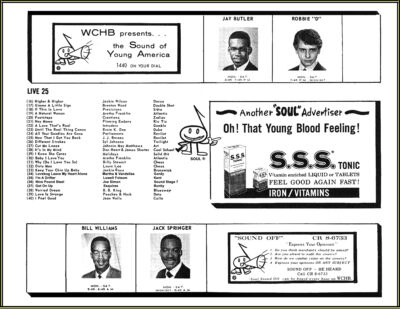 Robbie D’s unique style caught national attention, earning him a feature in Time magazine. The article described his signature delivery, calling him a “skinny, goateed chap who looks vaguely like a molting broom” and highlighting his quick slang on-air vocabulary. His impact on radio culture was undeniable—he was part of a wave of DJs who revved up their delivery to match the amplification of rock and soul music.
Robbie D’s unique style caught national attention, earning him a feature in Time magazine. The article described his signature delivery, calling him a “skinny, goateed chap who looks vaguely like a molting broom” and highlighting his quick slang on-air vocabulary. His impact on radio culture was undeniable—he was part of a wave of DJs who revved up their delivery to match the amplification of rock and soul music.
Robbie D was more than just a DJ—he was a radio phenomenon, bringing energy, unpredictability, and a deep love for Black music to Detroit’s airwaves. His legacy in WCHB’s history remains one of the most unique and unforgettable talent Detroit was gifted with when he was on the radio doing nights on Super Soul 1440 at the time.
Robbie D was a game-changer in Detroit’s R&B radio scene, bringing an unmatched energy to WCHB and helping to push Black music into the mainstream. His fast-talking, slang-heavy style made him a standout personality, and his deep love for R&B and soul ensured that Detroit’s Black artists got the airplay they deserved.
Robbie D’s Impact on Detroit’s R&B Scene
Robbie D was often the first DJ to introduce new R&B tracks, playing songs weeks before mainstream stations like WKNR, WXYZ, and CKLW picked them up. Elevating local R&B artists, He championed Detroit’s rising R&B stars, ensuring that Motown artists and independent Black musicians had a platform to reach the city’s Black audience. He hosted remote broadcasts from legendary Detroit venues, bringing live performances and interviews to the airwaves. His wild, unpredictable style made him a fan favorite, and his ability to engage listeners helped solidify WCHB’s reputation as Detroit’s go-to station for R&B.
A Legacy That Lives On
Robbie D’s impact on Detroit’s R&B scene was profound—he wasn’t just a DJ, he was a cultural force, ensuring that Black music remained at the forefront of urban radio. His Time magazine feature in 1967 was a testament to his influence, proving that his style, energy, and commitment to R&B made him one of the most memorable voices in Detroit radio history.
Ernie Durham, famously known as “Frantic Ernie D,” was one of Detroit’s most electrifying DJs, leaving a lasting impact on WCHB and beyond. His signature style, rapid-fire delivery, and deep connection with the Black community made him a legend of the airwaves.
Ernie Durham at WCHB: The Soul of Detroit Radio
Durham brought high energy and a unique rhythmic cadence to WCHB, captivating listeners with his fast-talking, dynamic style. His playlist featured the latest R&B and soul hits, spotlighting local artists, emerging Motown stars, and deep cuts that mainstream stations ignored. Durham’s presence went beyond music—he was deeply invested in Detroit’s Black community, using his platform to discuss social justice, labor rights, and civil rights activism. He was instrumental in live radio events, hosting record hops and nightclub broadcasts from various clubs and dance venues in the Motor City, such as The Chit-Chat Club, The 20-20-Club, and Baker’s Keyboard Lounge, as well.
The Move to WJLB in 1967
In 1967, Durham left WCHB along with Martha Jean “The Queen” Steinberg to join WJLB-AM 1400. At WJLB, he continued his signature fast-paced style, bringing soul, jazz, and community discussions to the station. He became one of the first DJs to host large-scale record hops, connecting Detroit’s youth with the music they loved. Durham’s impact on Black radio expanded as WJLB became a hub for soul music and community engagement into the 1970s.
His Lasting Legacy
Durham’s fast-talking, rhythmic delivery influenced generations of DJs, creating a distinct style in Black radio. His deep connection with Detroit’s R&B and soul scene helped define the city’s musical identity. Even after his passing, his impact lives on, remembered for his energy, passion, and dedication to Detroit’s Black radio movement.
You can explore more about Ernie Durham and his radio legacy here and here.
Bill Williams was a key figure in Detroit’s Black radio scene, serving as both a DJ and station programmer at WCHB-AM during its most influential years. His contributions helped shape the station’s sound, community engagement, and cultural impact.
Bill Williams at WCHB
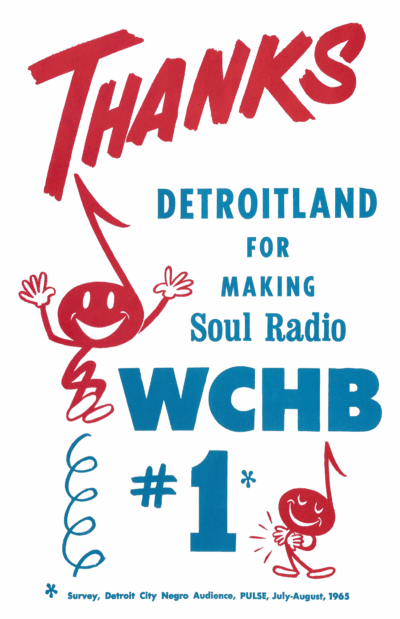 Williams was a respected voice on WCHB, known for his smooth delivery and deep connection to Detroit’s Black audience. He played a pivotal role in curating the station’s music programming, ensuring that WCHB remained a hub for R&B, soul, and gospel. As a station programmer, he helped develop WCHB’s identity, making it a trusted source for news, music, and civil rights discussions. His influence extended beyond the airwaves—he was actively involved in community initiatives, supporting local events and Black-owned businesses.
Williams was a respected voice on WCHB, known for his smooth delivery and deep connection to Detroit’s Black audience. He played a pivotal role in curating the station’s music programming, ensuring that WCHB remained a hub for R&B, soul, and gospel. As a station programmer, he helped develop WCHB’s identity, making it a trusted source for news, music, and civil rights discussions. His influence extended beyond the airwaves—he was actively involved in community initiatives, supporting local events and Black-owned businesses.
Williams was featured in WCHB advertisements in the 1960s, highlighting his importance to the station’s brand and outreach. His work at WCHB contributed to the station’s rise as a cultural powerhouse, ensuring that Detroit’s Black community had a platform for expression and empowerment. Even after WCHB transitioned ownership, his legacy remained, influencing future generations of Black radio professionals.
Bill Williams was more than a DJ—he was a cultural architect, shaping the way Detroit engaged with music and activism while he was station programmer at WCHB.
WCHB’s relationship with Motown Records was a defining element of Detroit’s Black radio scene in the 1960s, helping to elevate local R&B artists long before mainstream stations caught on. Unlike WKNR, WXYZ, and CKLW, which catered to broader pop audiences with limited R&B in general, WCHB was deeply embedded in Detroit’s Black music culture, ensuring that Motown’s rising stars had a direct line to the community.
WCHB & Motown: A Partnership That Shaped Music History
WCHB was often the first station to introduce new Motown hits, weeks before they appeared on Top 40 playlists, and showcasing local R&B talent. WCHB played a crucial role in promoting Motown’s early acts, including The Temptations, The Supremes, Marvin Gaye, and Stevie Wonder. Unlike mainstream stations, WCHB’s DJs were deeply connected to Detroit’s Black community, ensuring that Motown’s music resonated with its core audience.
Motown’s success was not just about the music—it was about representation. WCHB’s commitment to Black artists ensured that Detroit’s R&B scene thrived, giving local musicians a platform that mainstream radio often ignored. The station’s early support of Motown helped solidify Detroit’s reputation as the epicenter of soul music, influencing radio trends across the country.
The FM Evolution: WJZZ, Ownership Changes, & Legacy
 As WCHB thrived, Bell Broadcasting expanded into FM radio with WCHD-FM (105.9) in 1959. In the 1970s, WCHD became WJZZ, shifting its focus entirely to jazz, providing a platform for jazz legends and connecting listeners to Miles Davis, John Coltrane, and Ella Fitzgerald.
As WCHB thrived, Bell Broadcasting expanded into FM radio with WCHD-FM (105.9) in 1959. In the 1970s, WCHD became WJZZ, shifting its focus entirely to jazz, providing a platform for jazz legends and connecting listeners to Miles Davis, John Coltrane, and Ella Fitzgerald.
However, like many historic Black-owned media institutions, WCHB eventually faced ownership transitions. The station was sold to Crawford Broadcasting, marking the end of its era as a Black-owned entity. Under Crawford’s leadership, WCHB transitioned into a Christian and gospel format, a major shift from its original R&B and civil rights-driven identity.
Yet, WCHB’s legacy remains undeniable. The station laid the groundwork for Black radio in Detroit, shaping the way the city engaged with news, activism, and entertainment.
WCHB Today: A New Chapter in Detroit’s Radio Landscape
While WCHB began as a trailblazing Black-owned station, today it serves Detroit under a new identity as a gospel and Christian talk radio station. Owned by Crawford Broadcasting, WCHB now operates as “The Voice of the Church in Detroit”, offering a mix of Christian education, gospel music, and faith-based discussions.
Current Programming & Community Engagement
WCHB’s programming today reflects its faith-based mission, featuring:
- Morning Breakthrough (Weekdays, 9:15 AM – Noon) – A faith-driven talk show aimed at inspiring listeners.
- Moments of Inspiration (Weekdays, 9:00 AM) – A program focused on spiritual growth and encouragement.
- Prayer School Hour (Weekdays, 7:00 AM) – A segment dedicated to prayer and religious teachings.
- Hope Evangelical Ministries (Mon-Thurs, 12:45 PM) – A faith-based program offering biblical insights.
- End of Age (Weekdays, 6:30 AM) – A show discussing Christian prophecy and teachings.
Despite its shift in focus, WCHB remains a pillar of Detroit’s radio landscape, continuing its legacy of community engagement, albeit with a faith-based approach. The station still serves as a platform for local voices, ensuring that Detroit’s residents have access to spiritual guidance, gospel music, and Christian discussions.
A Legacy That Lives On
WCHB and WJZZ remained cornerstones of Detroit radio for decades, delivering music, news, and community engagement. In 1990, WCHB transitioned from 1440 KC to 1200 KC, expanding its broadcast reach to better serve Detroit and its surrounding areas. Alongside this shift, the station strengthened its commitment to news programming, ensuring that residents stayed informed on local affairs. Key city leaders, including the mayor and Detroit City Council members, frequently appeared on-air to discuss pressing issues.
By 1991, WCHB had grown into a thriving operation, employing forty staff members and reaching an estimated 80,000 listeners. However, as competition intensified in the late 1990s, the landscape of Detroit radio began to change. In 1997, WCHB and WJZZ were acquired by Radio One for $34 million, marking the end of Bell Broadcasting Company’s influential tenure in Detroit’s radio history.
Though WCHB’s format has changed, its historical significance remains undeniable. From its civil rights activism to its musical influence, WCHB’s impact on Detroit’s Black community is woven into the city’s cultural fabric. Today, it continues to serve as a beacon of faith and inspiration, proving that radio remains a powerful force for connection and empowerment. Dr. Haley Bell, a pioneer first in Black broadcasting, passed away in 1973, leaving behind a lasting imprint on Detroit’s radio landscape. His business partner, Dr. Wendell Cox, continued their shared vision until his passing in 2007. Mary Bell, Haley’s wife, played a crucial role as an executive, helping steer the company’s success until her passing in 1995. Their collective contributions shaped WCHB’s legacy, cementing its place as a groundbreaking institution in radio history.
A Lasting Influence: WCHB’s Place in American Radio History
WCHB was more than a radio station—it was a movement. It provided representation in an era when Black voices were often silenced, gave Detroit’s African American community a direct line to the music and conversations that mattered, and played a crucial role in civil rights history.
As Black radio continues to evolve, WCHB stands as a testament to the power of ownership, community, and culture. Its story remains etched into Detroit’s musical and social legacy, reminding us of the impact that visionary leadership and fearless broadcasting can have while reaching out to a community having served in good standing.
From its pioneering launch in 1956 to its evolution into gospel and faith-based programming, WCHB’s journey is nothing short of revolutionary. It wasn’t just a radio station—it was a force of change, a microphone for Black voices, and a bridge between culture, community, and civil rights.
It was the station that Detroit turned to in times of joy, struggle, and transformation. It was where music legends were born, civil rights leaders were heard, and community movements gained momentum. WCHB was a beacon of empowerment when Black ownership in media was rare, ensuring that Detroit’s African American population had a seat at the table in shaping their own narratives.
Even though its format has changed, its soul remains—a reminder of what radio can accomplish when driven by vision, resilience, and the unbreakable spirit of a community. The impact of WCHB will never fade, as its legacy continues to influence Detroit’s media, music, and activism.
The heartbeat of Detroit’s Black radio history is still pulsing, and WCHB will forever be its boldest rhythm.
_____________________
A USARM Viewing Tip: On your mobile or tablet device? Finger-tap all the above images inside the post and stretch image across your device’s screen for LARGEST digitized view.

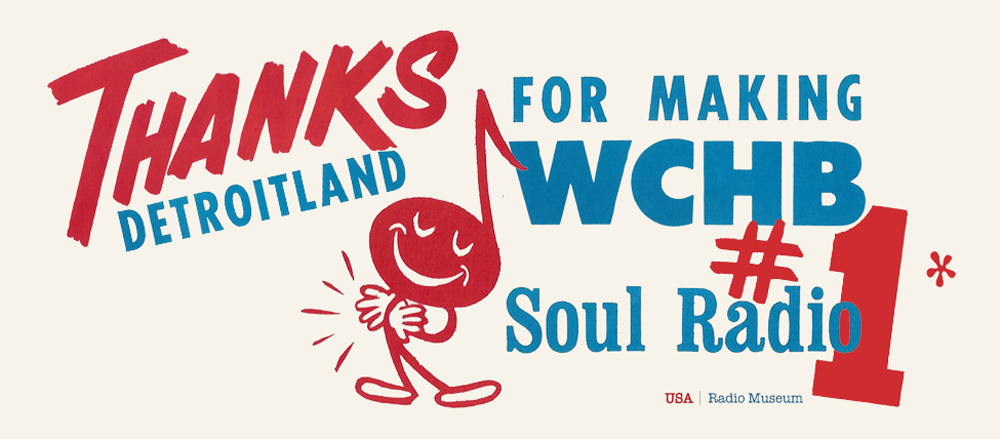
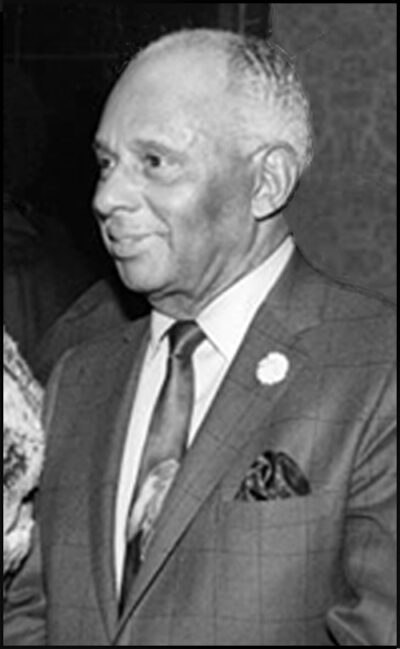
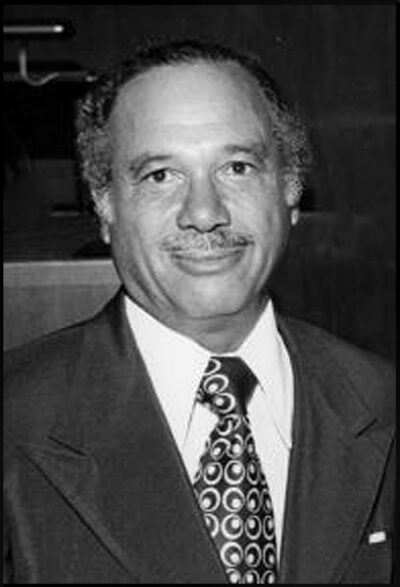
But not only that Jim WCHB-AM and WCHD-FM A.K.A. WJZZ would be the influence for WJLB’s big move from AM 14 to the now legendary and iconic fm 98 as they would ushering in the new era of not just Black Radio, but also unleashing the CHUrban/Crossover format too as well under their new slogan “Detroit’s Strongest Songs!” or “Strong Songs!” for short.